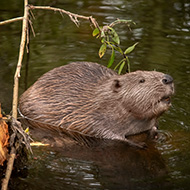Study explores health outcomes in wildlife reintroduction projects

The paper discusses the full range of health conditions with potential associations to conservation translocation.
A study on the health outcomes in wildlife reintroduction projects has been published, exploring the full range of health conditions potentially associated with conservations translocations.
Conservation translocations, the reinforcement, reintroduction or ecological replacement of wildlife, have become common in wildlife and conservation projects. These have been very important in helping endangered animals and plants to recover.
As the researchers note, however, with no guaranteed positive outcomes, these translocations are costly, challenging and take a long time to complete. The study, which reviews reports of previous projects, has created an evidence base to inform future reintroduction projects.
Katie Beckmann, PhD student at the Royal Veterinary College (RVC) and corresponding author on the study, explained: “Health has been somewhat overlooked in the field of reintroduction science.
“In this study, we explore health outcomes in reintroduced animals and plants, and other populations linked to reintroduction.
“We show why health is important to foster and consider how it ‘fits in’ in relation to all the ecological, environmental and human-related threats that need to be considered, and overcome, in order for reintroduction projects to be successful.”
Published in Ecological Solutions and Evidence, the study summarised information about disease and other biological problems reported in case studies of conservation translocations.
In the case studies 'disease' problems were described as a 'major difficulty', 'major lesson learned' or 'reason for...failure' in 30 per cent of the studies. These problems included infection, stress and husbandry-related disorders.
These disease problems were far more likely to be mentioned in projects with poorer success ratings, suggesting the importance of disease as an inhibitor to success in reintroduction projects.
Another type of biological problem was reported in 66 per cent of the case studies under the same subheadings, including post-release predation, adverse climate/weather and anthropogenic trauma. Even when cases were considered highly successful, these issues were still commonly reported.



 The Veterinary Medicines Directorate (VMD) is inviting applications from veterinary students to attend a one-week extramural studies (EMS) placement in July 2026.
The Veterinary Medicines Directorate (VMD) is inviting applications from veterinary students to attend a one-week extramural studies (EMS) placement in July 2026.